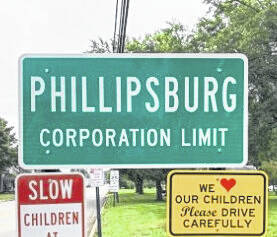
Phillipsburg residents will receive letters explaining why the village is increasing its water rates with their April 11 bill. The new rates will take effect May 1.
File photo
PHILLIPSBURG — Phillipsburg’s board of public affairs at the March 8 meeting decided to raise water rates. Letters explaining the reasons will arrive with the April bill, and the new rates will take effect May 1.
Under the new schedule, residents will pay a flat rate of $40 for usage up to 6,000 gallons a month. This is an increase of $10 but gives residents an extra 1,000 gallons before they have to pay for additional usage. Low-income residents will pay $15.
Additional usage over 6,000 gallons will still cost $4 for up to 1,000 additional gallons.
The late fee will increase to $20 for most homeowners but will remain at $10 for low-income residents.
Besides the normal increase in maintenance costs, the village is facing the problem of cleaning the water of PFAS.
Although the board voted at a special meeting on Feb. 28 to solve the problem by purchasing water from the City of Union, members had comments about the draft of the proposed contract.
This solution is contingent upon Union’s water being uncontaminated, but the last test of that city’s water was two years ago, and the various people involved in the testing haven’t coordinated yet.
Union’s distribution system, potable water supply and wastewater treatment plant effluent meet or exceed all Environmental Protection Agency (EPA) requirements.
Board President Mary Combs asked what would happen if Union’s water became contaminated in a few years. While such a situation would be up to Union to solve, any increased costs would be passed along to homeowners, including those in Phillipsburg.
The board had rejected a reverse osmosis system as cheaper to install but more expensive to maintain, and Keith Koontz asked if it would be possible to purchase units for each house in the village, leaving the responsibility for maintenance to the homeowners.
Member Jackie Wysong has such a unit but said if the house doesn’t have a basement where the unit could be hooked up to the main water connection, it would take up a lot of space and would only protect the water in a specific tap.
Wysong suggested one benefit of connecting to Union would be the possible future income if rural residents along the pipeline wanted to tie into the system rather than use their own wells.
Questioned as to whether a deeper well would reach an uncontaminated level of the aquifer and what that would cost, Water Commissioner Wendell Harleman was unsure, but promised to look into the matter.
One member asked what would happen if the village did nothing.
Combs said there would be a large fine by the Environmental Protection Agency, and Mayor Shawna Newsom, attending the meeting as a guest and advisor, said the village could be decommissioned and made part of Clay Township.
A basic argument was that regionalization offered the possibility of several grants, and the village would have problems affording the other solutions.
Any further decision will have to wait until Union’s water is tested (and until a tornado watch doesn’t cause a quick adjournment).

